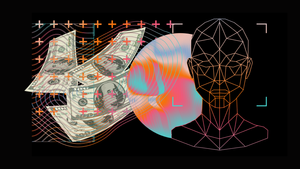A white paper published by CIAM and the Fair Trade Music programme has set out proposals for a new remuneration right that would see creators earn royalties when generative AI models have been trained with their work.
The paper has been written by Professor Daniel Gervais, who is director of the intellectual property programme at Vanderbilt Law School in Nashville.
Illustrating how the new right would work in practice, the white paper explains, “when a music streaming service filled a stream with AI-produced music, it would pay for the use of the copyrighted works in the dataset used by its generative AI model”.
That payment would be in addition to any income generated by licensing deals negotiated by copyright owners at the point the AI model was trained.
A right of this kind is urgently needed, the white paper states, because AI that generates original content “challenges humans on the very terrain that has distinguished us from other species for millennia: our ability to create literary and artistic works to communicate new ideas to one another, whether as works of music, art, literature or journalism”.
Introducing such a right to allow human creators to continue to earn from that work “would be another adaptation of the copyright framework” in response to “a major technological change, as copyright has consistently done for more than two centuries”, it adds.
Indeed, “it would be strange if copyright did not adapt to what is perhaps the most consequential technological change in history”.
Gervais dissects the various copyright debates that have been sparked by the growth of generative AI, before adding that - despite all the legal complexities still be navigated - “there is a deep sense among many authors and performers that the creation of datasets containing their tokenised works without consent or compensation is an unfair situation, a misappropriation, for which they expect the law to provide a remedy”.
The music and wider copyright industries are adamant that any AI company training a generative AI model with existing content - and therefore copying that content onto their servers - must first get permission from the relevant copyright owners by negotiating a licensing deal and paying a licensing fee.
However, many tech companies argue that AI training is covered by data mining exceptions under certain copyright systems - or constitutes ‘fair use’ under the US system - meaning no permission is required.
That argument is now the subject of multiple lawsuits, including the case pursued by a group of music publishers against Anthropic, and by the major record companies against Udio and Suno.
There are additional debates about if and how copyright is exploited by generative AI beyond the initial copying of existing content into a training dataset.
Gervais writes that, when content is reproduced by an AI company as it is ingested into a dataset, “this reproduction of the copyrighted work continues to exist in modified form (ie a second reproduction occurs) in the dataset. This second dataset is the one used by the model to produce its outputs. It consists of the creation of ‘tokens’ based on the material used for training”.
The outputs of the model, he goes on, “may infringe both the right of reproduction and the right to prepare derivative works, also known as the right of adaptation. An adaptation includes, for example, a musical arrangement or a film based on a novel”. However, he concedes, “the exact scope of the concept of derivative works in this area is controversial”.
Some would argue, Gervais goes on, that “anything created using a data corpus containing tokenised copyrighted material is a ‘derivative’ of the dataset, and in a layman’s sense this is the case, since no output would be generated if it weren’t ‘derived’ from the dataset by the generative AI application. Unfortunately, the legal terms ‘adaptation’ and ‘derivative work’ are likely to be interpreted more narrowly by the courts”.
While the copyright obligations of AI companies in terms of licensing content upfront at the start of the training process continue to be debated in court, Gervais argues that a new remuneration right on the output of generative AI would provide creators with some legal certainty.
Plus, crucially, an “ongoing layer of compensation for the benefit of music creators and rightsholders for generative AI systems that produce material in competition with the creators of the copyrighted material on which they were trained”.

